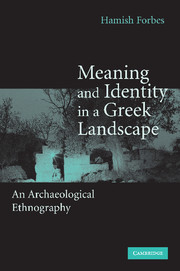Book contents
- Frontmatter
- Contents
- List of Illustrations and Tables
- Preface and Acknowledgements
- Transliteration Conventions
- 1 Introduction
- 2 Landscape Studies: From Frame-and-Tame to Visceral Feeling
- 3 Historical Background to the Landscape of Methana
- 4 Conducting Fieldwork on Methana
- 5 Kinship, Marriage and the Transmission of Names and Property
- 6 The Productive Landscape
- 7 The Historical Landscape: Memory, Monumentality and Time-Depth
- 8 The Kinship Landscape
- 9 The Religious Landscape
- 10 Conclusions: A Greek Landscape from Within
- Glossary
- Notes
- References
- Index
5 - Kinship, Marriage and the Transmission of Names and Property
Published online by Cambridge University Press: 04 May 2010
- Frontmatter
- Contents
- List of Illustrations and Tables
- Preface and Acknowledgements
- Transliteration Conventions
- 1 Introduction
- 2 Landscape Studies: From Frame-and-Tame to Visceral Feeling
- 3 Historical Background to the Landscape of Methana
- 4 Conducting Fieldwork on Methana
- 5 Kinship, Marriage and the Transmission of Names and Property
- 6 The Productive Landscape
- 7 The Historical Landscape: Memory, Monumentality and Time-Depth
- 8 The Kinship Landscape
- 9 The Religious Landscape
- 10 Conclusions: A Greek Landscape from Within
- Glossary
- Notes
- References
- Index
Summary
ολοκύθι γιά αΐ και συμπεθέροι γιά συγγενείς (pumpkin for meat [literally: ‘food’] and in-laws for relatives).
(Methana saying, reported by Clark 1988, 192–3)The village family is a web of vital dependencies among its members: mother-wife, husband-father, children and grandparents. Each person has a place in the system, is sustained by it, contributes to it (especially as an adult), and is concerned about its well-being. To the villagers, interaction with relatives, neighbours, and friends is the spice that gives life its savor; but it is the family that sustains and gives meaning to life…. People perceive the family as the natural solution to the division into male and female, each with different skills and roles. Each sex is deficient without the other; each complements the other's aptitudes and natures.
(Aschenbrenner 1986, 40–1)The great importance of the family to the villagers rests partially on the fact that it is the only enduring social group with which they identify and to which their energy is directed. The family has many and diverse functions and is embedded in nearly every sphere of life…. the family constitutes an economic team that farms its holdings and most of the non-agricultural pursuits of contemporary villagers are also carried out as family operations. Even now, with the advent of bank loans, it is still the case that the holdings and wealth of a given family economic team originate mostly through inheritance and dowry from the family groups in which a father and mother were reared.[…]
- Type
- Chapter
- Information
- Meaning and Identity in a Greek LandscapeAn Archaeological Ethnography, pp. 116 - 176Publisher: Cambridge University PressPrint publication year: 2007

